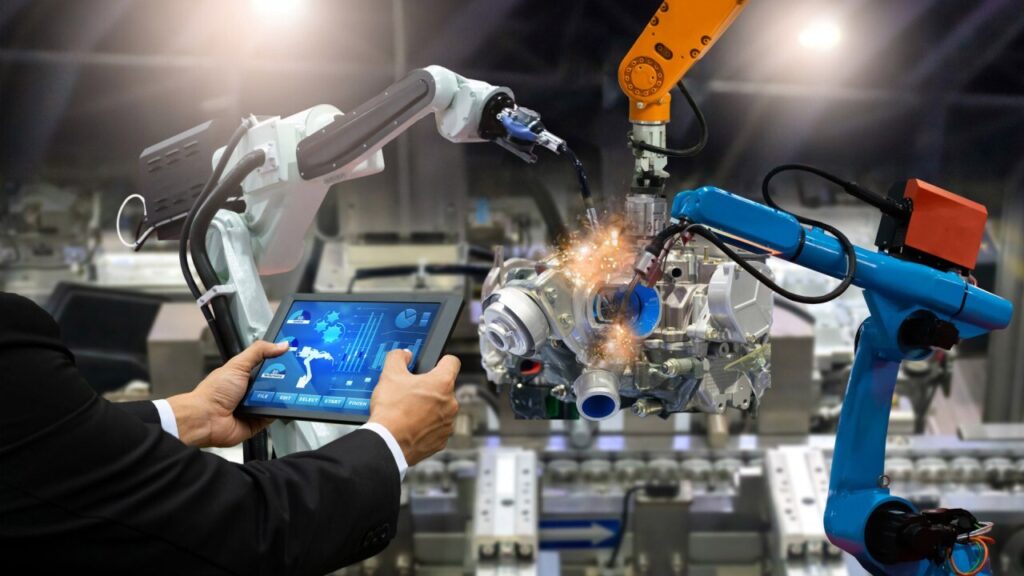Revolutionizing the Manufacturing Industry: The Future is Now

Confronted with an evolving retail landscape, a prominent retail chain sought Maceforce’s expertise to address critical operational inefficiencies and modernize its customer engagement and sales strategies. This detailed case study outlines the comprehensive approach adopted by Maceforce, highlighting the intricacies of the project and the profound impact of its execution.
Smart Factories: The Integration of IoT and AI
The manufacturing industry is undergoing a seismic shift, driven by the integration of the Internet of Things (IoT) and Artificial Intelligence (AI). Smart factories are at the forefront of this revolution, utilizing interconnected devices and advanced algorithms to enhance production efficiency, reduce downtime, and predict maintenance needs. By leveraging IoT sensors and AI-driven analytics, manufacturers can gain real-time insights into their operations, leading to optimized processes and improved product quality.
Additive Manufacturing: The Rise of 3D Printing
3D printing, or additive manufacturing, is transforming how products are designed and manufactured. This technology allows for the creation of complex geometries that were previously impossible with traditional methods, reducing material waste and enabling rapid prototyping. Companies are now able to bring products to market faster and customize them to meet specific customer needs, offering unprecedented flexibility in manufacturing.
Robotics and Automation: Enhancing Precision and Productivity
The deployment of advanced robotics and automation systems is revolutionizing production lines across the globe. These technologies increase precision, reduce human error, and enhance productivity by performing repetitive and dangerous tasks. Collaborative robots, or cobots, are particularly noteworthy as they work alongside human operators, combining the strengths of both to achieve superior outcomes.
Sustainable Manufacturing: Eco-Friendly Innovations
Sustainability is becoming a key focus in manufacturing. Innovations such as energy-efficient machinery, renewable energy integration, and waste reduction techniques are helping companies reduce their environmental footprint. Circular economy principles, where products are designed for reuse, recycling, and remanufacturing, are also gaining traction, paving the way for a more sustainable industrial future.
Advanced Materials: Breaking New Grounds
The development of advanced materials like graphene, carbon fiber composites, and nanomaterials is opening new possibilities in manufacturing. These materials offer superior strength, lighter weight, and enhanced durability, allowing manufacturers to create high-performance products. The adoption of these materials is particularly impactful in industries such as aerospace, automotive, and electronics, where performance and efficiency are critical.
Digital Twins: Simulating Success
Digital twin technology, which involves creating a virtual replica of a physical asset, is revolutionizing how manufacturers design, monitor, and maintain their products. These digital models provide real-time data and predictive analytics, enabling companies to optimize operations, improve product performance, and reduce costs. By simulating different scenarios, manufacturers can identify potential issues and make data-driven decisions to enhance their processes.
Blockchain: Ensuring Transparency and Security
Blockchain technology is poised to revolutionize supply chain management in the manufacturing industry. By providing a secure and transparent way to record transactions, blockchain can enhance traceability, reduce fraud, and improve the efficiency of supply chains. Manufacturers can ensure the authenticity of products, track their journey from production to end-user, and maintain an immutable record of transactions, fostering trust and accountability.
Workforce Transformation: Skills for the Future
As the manufacturing industry evolves, so too must the skills of its workforce. Embracing new technologies requires a shift in the skill sets of employees, with a greater emphasis on digital literacy, data analysis, and advanced technical skills. Companies are investing in training and development programs to upskill their workforce, ensuring they are prepared to thrive in this new industrial landscape. Collaboration between industry, academia, and government is crucial to developing the talent pipeline needed for the future.
Cybersecurity: Protecting Digital Manufacturing
With the increased connectivity of manufacturing systems comes a heightened risk of cyber threats. Protecting sensitive data and ensuring the integrity of manufacturing processes are paramount. Implementing robust cybersecurity measures, such as advanced encryption, network segmentation, and continuous monitoring, is essential to safeguard against cyberattacks. Manufacturers must prioritize cybersecurity to maintain operational resilience and protect their intellectual property.
Globalization and Localization: Balancing Act
The manufacturing industry is navigating the complexities of globalization and localization. While global supply chains offer cost advantages and access to new markets, localized production can enhance responsiveness and reduce risks associated with global disruptions. Companies are adopting hybrid strategies that balance global efficiency with local agility, leveraging advanced manufacturing technologies to adapt to changing market dynamics.
The manufacturing industry is at the cusp of a transformative era. By embracing these revolutionary technologies and trends, manufacturers can enhance their competitiveness, drive innovation, and pave the way for a sustainable and prosperous future. The key to success lies in agility, collaboration, and a relentless pursuit of excellence in this dynamic industrial landscape.